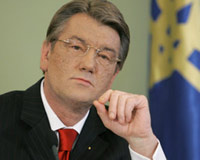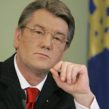
YUSHCHENKO RULES TO DISSOLVE PARLIAMENT
Publication: Eurasia Daily Monitor Volume: 4 Issue: 65
By:

Yesterday, April 2, Ukrainian President Viktor Yushchenko signed a decree dissolving parliament, which the parliamentary majority immediately rejected. Yushchenko’s opponents — the ruling coalition, consisting of Prime Minister Viktor Yanukovych’s Party of Regions (PRU), the Socialists, and the Communists — believe that Yushchenko had no legal grounds for this move.
Yushchenko has been prompted into action by the growing numerical strength of his opponents in parliament. Expecting an exodus of parliamentarians from the opposition, which consists of the Yulia Tymoshenko Bloc and Yushchenko’s Our Ukraine, the ruling coalition wanted to expand its ranks from the current 260 or so members to 300 — the so-called constitutional majority, which would allow the coalition to override Yushchenko’s vetoes of laws or amend the constitution without his consent. Yushchenko had said on many occasions during his public appearances that this would mean a “usurpation” of power.
Yushchenko and his allies were seriously frightened by the appointment of a former Yushchenko ally, Anatoly Kinakh, as economics minister in Yanukovych’s government, which triggered the defection of 10 deputies from the two opposition factions on March 23. Yanukovych and parliamentary speaker Oleksandr Moroz, who is the leader of the Socialists, promised that the ruling coalition would grow to 300 deputies by summer. Yushchenko took the appointment as a serious threat and Tymoshenko as an opportunity to revise the results of the March 2006 parliamentary election and the ensuing competition for the post of prime minister, which she lost to Yanukovych.
According to the Ukrainian constitution, the president may dissolve parliament if: parliament works without a majority coalition for more than a month; a Cabinet is not formed within two months; or if parliament fails to convene for more than a month. Yushchenko insists that the first reason applies, as the joining of the majority by the defectors from the opposition, he argues, de-legitimized the ruling coalition. His opponents argue that the ruling coalition is legal, because it was formed by deputy factions, and the defectors did not play any role in its formation.
On March 23, Tymoshenko announced that the Committee of National Salvation, which was one of the driving forces of the Orange Revolution, is resuming its work. It was also apparently she who provided Yushchenko with the formal reason for parliament’s dissolution – the ruling coalition was formed not just by the three factions, but also through the inclusion of defectors from the opposition. Former Interior Minister Yury Lutsenko — an ally of Yushchenko and the leader of the opposition People’s Self-Defense Movement — who had been skeptical about parliamentary dissolution, changed his mind and sided with Tymoshenko. Yushchenko, addressing a press conference in Luhansk on March 29, said that he would disband parliament if, as he put it, the majority continues to violate the constitution.
Yushchenko and Tymoshenko have attempted to show that the dissolution of parliament would not be their own, but rather the people’s will. The head of Yushchenko’s secretariat, Viktor Baloha, said on March 28 that Yushchenko had received more than 8,000 letters “from all regions without exception” urging him to dissolve parliament. The opposition also invited their supporters from across Ukraine to a massive rally in Kyiv on March 31 to demonstrate their strength to Yanukovych and remind him of the Orange Revolution.
Yanukovych’s allies were ready to face the challenge. Also on March 31, tens of trains and buses brought thousands of people, mostly from the east and south of Ukraine, for a show of strength of the ruling coalition in Kyiv. As a result, the political opponents simultaneously held the largest peaceful rallies since the Orange Revolution in 2004 on the same central street, Khreshchatyk, divided by police cordons. About 60,000 people participated, and the supporters of the ruling coalition outnumbered those of the opposition. What’s more, several thousand Yanukovych’s supporters did not go home afterwards, but set up a tent camp near parliament, protesting Yushchenko’s plans to dissolve the legislature.
The ruling coalition warned that it would contest Yushchenko’s dissolution orders. Deputy Prime Minister Dmytro Tabachnyk told journalists on March 30 that the authors of a presidential decree declaring parliament’s dissolution would be charged with abuse of office. One of the leaders of PRU, Vasyl Kyselyov, said on the same day that parliament might disband the Central Electoral Commission, thereby making an early election impossible. The leader of the PRU’s parliamentary faction, Raisa Bohatyreva, said on April 2 that, if Yushchenko signs a decree to dissolve parliament, the coalition would appeal to the Constitutional Court. And Moroz said that parliament’s dissolution would be tantamount to a coup.
This left Yushchenko unabashed. He gathered the parliamentary faction leaders in his secretariat on April 2 to announce to them his decision to disband parliament. Communist leader Petro Symonenko, speaking after the meeting, said that Yushchenko was visibly determined to not accept any compromise solution. As Yushchenko was signing the decree to disband parliament, the ruling coalition gathered for an emergency session and approved an address to the nation, saying that the decree would not be obeyed because of its illegality. The coalition has officially asked the Constitutional Court to solve the impasse. The Cabinet, which gathered for an emergency meeting at night, backed the coalition. Defense Minister Anatoly Hrytsenko, however, said that the army remains loyal to Yushchenko. If parliament is dissolved, an early parliamentary election should be held within two months.
(Ukrayinska pravda, March 23; Ukrainski novyny, March 30; Channel 5, March 29-April 2; Channel 5, April 3)




